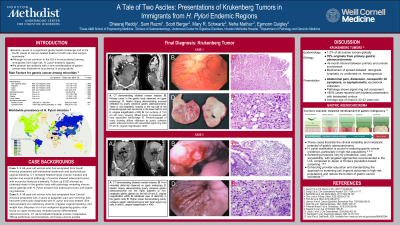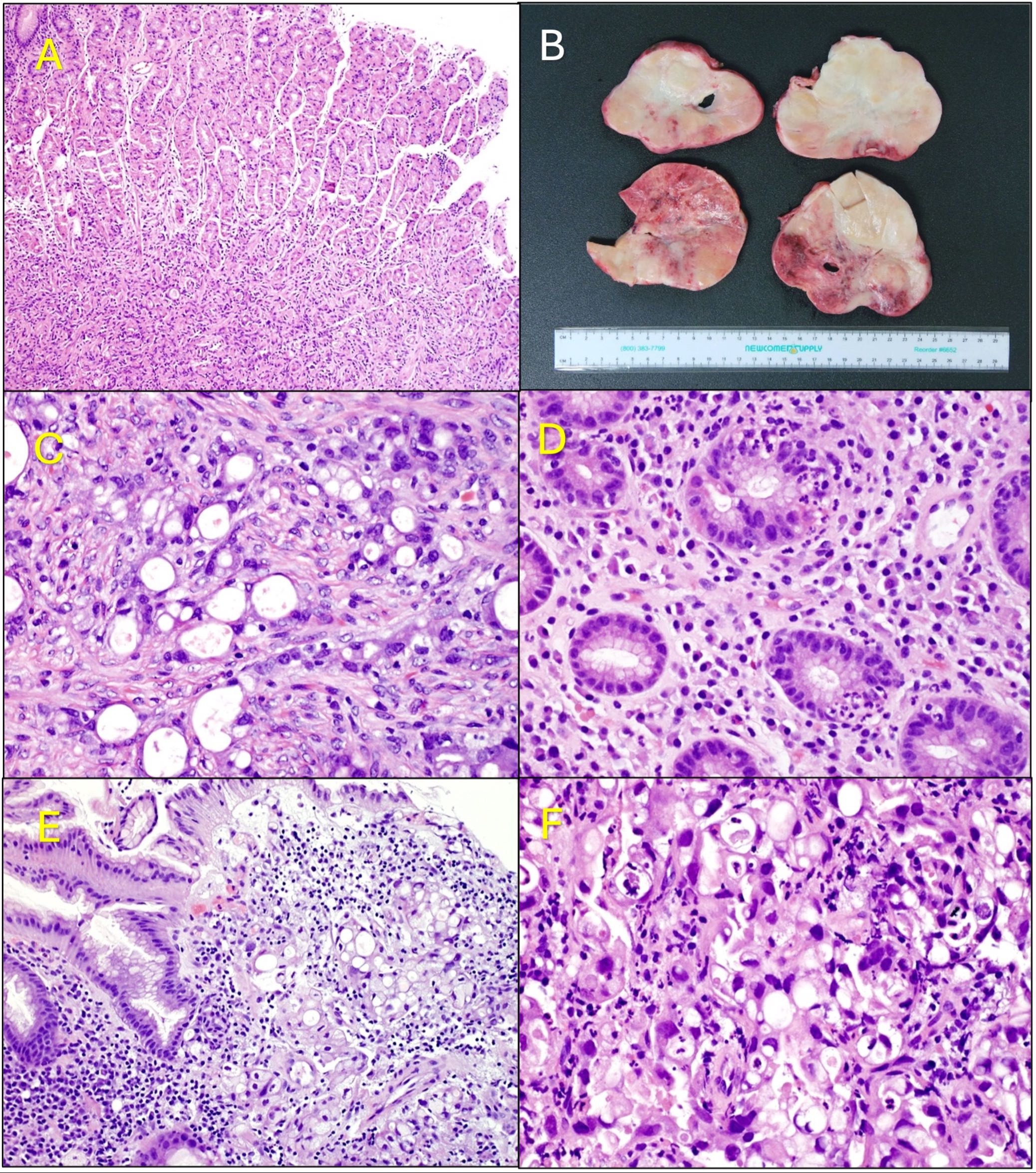Monday Poster Session
Category: Stomach
P3409 - A Tale of Two Ascites: Krukenberg Tumors in the setting of Gastric Cancer and Chronic H. Pylori
Monday, October 28, 2024
10:30 AM - 4:00 PM ET
Location: Exhibit Hall E

Has Audio

Dheeraj Reddy, BA
Texas A&M School of Medicine
Houston, TX
Presenting Author(s)
Dheeraj Reddy, BA1, Samuel Razmi, BS1, Scott Berger, MD2, Mary R. Schwartz, MD2, Eamonn Quigley, MD2, Neha Mathur, MD2
1Texas A&M School of Medicine, Houston, TX; 2Houston Methodist Hospital, Houston, TX
Introduction: Gastric cancer is a significant global health challenge. Chronic H. pylori infection is implicated in the progression from gastritis to gastric adenocarcinoma. This report highlights two previously healthy immigrants from high-risk areas with the same rare diagnosis of Krukenberg tumors after previous H pylori infection. These cases underscore the need for more effective gastric cancer screening methods for at-risk individuals in the US.
Case Description/Methods: Case 1: A 65-year-old woman presented with abdominal distension and dysfunctional vaginal bleeding. Computed tomography revealed bilateral large ovarian masses and ascites. She underwent bilateral oophorectomy. Pathologic examination demonstrated poorly differentiated adenocarcinoma with focal signet ring cell features. Follow-up endoscopy identified a 4-cm ulcerated gastric antrum mass with biopsy-confirmed poorly differentiated invasive adenocarcinoma and chronic active H. pylori gastritis. She was diagnosed with stage IV gastric adenocarcinoma with Krukenberg tumors and commenced chemotherapy. H. pylori eradication was confirmed following amoxicillin-based triple therapy.
Case 2: A 36-year-old woman presented with three years of epigastric pain and vomiting. She was diagnosed with H. pylori and had persistent iron deficiency anemia, irregular vaginal bleeding, and weight loss. Biopsies of a 4 cm malignant-appearing gastric ulcer found at upper endoscopy revealed poorly differentiated adenocarcinoma. Computed tomography demonstrated bilateral ovarian metastases, diffuse peritoneal carcinomatosis, and large-volume ascites.
Discussion: These cases illustrate the clinical variability and metastatic potential of gastric adenocarcinoma. H. pylori eradication is crucial in reducing gastric cancer incidence. Screening protocols vary by prevalence, cost, and accessibility, with targeted approaches recommended in the U.S. compared to Japan or Korea’s population-based screening. Enhancing provider education and standardizing protocols can improve outcomes in high-risk populations. Effective H. pylori screening and management are vital for preventing gastric cancer in high-risk populations. Standardized protocols and global consensus on screening can potentially reduce the burden of gastric cancer worldwide.

Disclosures:
Dheeraj Reddy, BA1, Samuel Razmi, BS1, Scott Berger, MD2, Mary R. Schwartz, MD2, Eamonn Quigley, MD2, Neha Mathur, MD2. P3409 - A Tale of Two Ascites: Krukenberg Tumors in the setting of Gastric Cancer and Chronic H. Pylori, ACG 2024 Annual Scientific Meeting Abstracts. Philadelphia, PA: American College of Gastroenterology.
1Texas A&M School of Medicine, Houston, TX; 2Houston Methodist Hospital, Houston, TX
Introduction: Gastric cancer is a significant global health challenge. Chronic H. pylori infection is implicated in the progression from gastritis to gastric adenocarcinoma. This report highlights two previously healthy immigrants from high-risk areas with the same rare diagnosis of Krukenberg tumors after previous H pylori infection. These cases underscore the need for more effective gastric cancer screening methods for at-risk individuals in the US.
Case Description/Methods: Case 1: A 65-year-old woman presented with abdominal distension and dysfunctional vaginal bleeding. Computed tomography revealed bilateral large ovarian masses and ascites. She underwent bilateral oophorectomy. Pathologic examination demonstrated poorly differentiated adenocarcinoma with focal signet ring cell features. Follow-up endoscopy identified a 4-cm ulcerated gastric antrum mass with biopsy-confirmed poorly differentiated invasive adenocarcinoma and chronic active H. pylori gastritis. She was diagnosed with stage IV gastric adenocarcinoma with Krukenberg tumors and commenced chemotherapy. H. pylori eradication was confirmed following amoxicillin-based triple therapy.
Case 2: A 36-year-old woman presented with three years of epigastric pain and vomiting. She was diagnosed with H. pylori and had persistent iron deficiency anemia, irregular vaginal bleeding, and weight loss. Biopsies of a 4 cm malignant-appearing gastric ulcer found at upper endoscopy revealed poorly differentiated adenocarcinoma. Computed tomography demonstrated bilateral ovarian metastases, diffuse peritoneal carcinomatosis, and large-volume ascites.
Discussion: These cases illustrate the clinical variability and metastatic potential of gastric adenocarcinoma. H. pylori eradication is crucial in reducing gastric cancer incidence. Screening protocols vary by prevalence, cost, and accessibility, with targeted approaches recommended in the U.S. compared to Japan or Korea’s population-based screening. Enhancing provider education and standardizing protocols can improve outcomes in high-risk populations. Effective H. pylori screening and management are vital for preventing gastric cancer in high-risk populations. Standardized protocols and global consensus on screening can potentially reduce the burden of gastric cancer worldwide.

Figure: A: Case 1: Gastric biopsy demonstrating mucosal infiltration by poorly cohesive gastric adenocarcinoma. There is non-neoplastic mucosa in the top half of the photomicrograph and carcinoma in the lower half (H and E, original magnification x100) B: Case 1: Cut surfaces of enlarged (19.6 cm) left ovary showing diffuse involvement by tumor with focal associated hemorrhage. C: Case 1: Photomicrograph of ovary showing diffuse infiltration by poorly cohesive gastric adenocarcinoma with associated signet ring cells (H and E, original magnification x400) D: Case 1: Photomicrograph of random gastric biopsies showing chronic gastritis. Note the activity with neutrophilic infiltration of two central glands (H and E, original magnification x400). E: Case 2: Gastric biopsy demonstrating poorly cohesive gastric adenocarcinoma (on the right) adjacent to non-neoplastic gastric glands (on the left) (H and E, original magnification x200). F: Case 2: Higher power demonstrating poorly cohesive gastric adenocarcinoma with focal signet ring cells (H and E, original magnification × 400).
Disclosures:
Dheeraj Reddy indicated no relevant financial relationships.
Samuel Razmi indicated no relevant financial relationships.
Scott Berger indicated no relevant financial relationships.
Mary Schwartz indicated no relevant financial relationships.
Eamonn Quigley: Atmo Biosciences – Advisor or Review Panel Member, Consultant, Grant/Research Support. Cindome – Grant/Research Support. Food Marble – Consultant. Nimble – Consultant. Novozymes – Consultant. Takeda – Grant/Research Support. Vibrant – Advisor or Review Panel Member, Consultant, Grant/Research Support. Vibrant Advisory Board – Advisory Committee/Board Member.
Neha Mathur: Ardelyx – Advisory Committee/Board Member. Sanofi and Regenernon – Advisory Committee/Board Member, Speakers Bureau.
Dheeraj Reddy, BA1, Samuel Razmi, BS1, Scott Berger, MD2, Mary R. Schwartz, MD2, Eamonn Quigley, MD2, Neha Mathur, MD2. P3409 - A Tale of Two Ascites: Krukenberg Tumors in the setting of Gastric Cancer and Chronic H. Pylori, ACG 2024 Annual Scientific Meeting Abstracts. Philadelphia, PA: American College of Gastroenterology.
